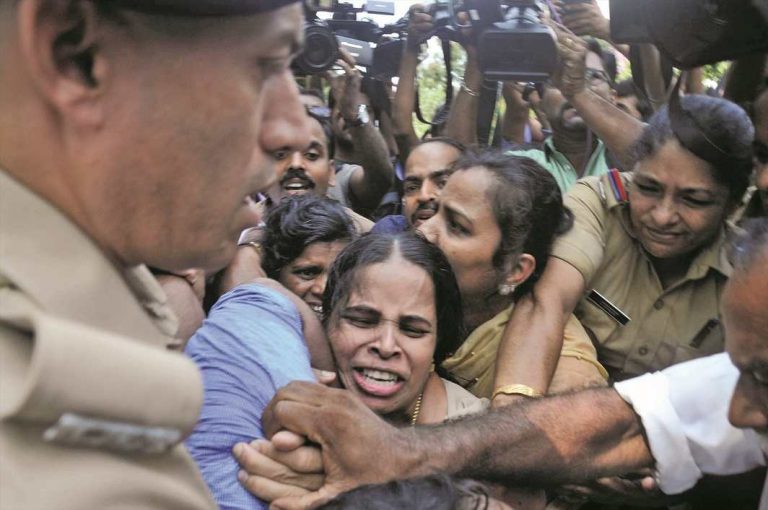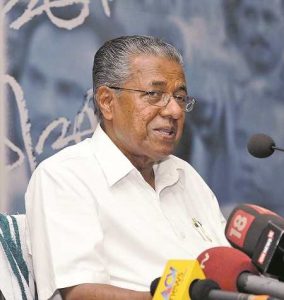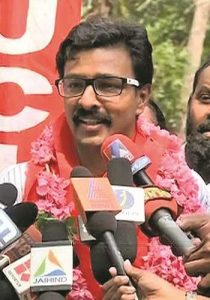
The LDF government has drawn flak for slapping charges against dissenters. Are democratic protests under threat now with the use of the Unlawful Activities (Prevention) Act?
~By Naveen Nair in Thiruvananthapuram
Activists and protestors in Kerala have been at the receiving end of the government’s ire, resulting in various sections of the Unlawful Activities (Prevention) Act (UAPA) being slapped on them. Recently, crackdown on dissenters was witnessed during the protests relating to the death of Jishnu Prannoy, an engineering student whose family alleges that he was murdered.
On April 5, when Jishnu’s mother and family proceeded towards the DGP’s office with a few activists demanding justice, the police stopped and detained them. These included KM Shajahan, an activist, Shajir Khan, an educationist who spearheaded many agitations against corrupt practices, and Khan’s wife, Mini, a civil rights activist and lawyer. While the victim’s family was let off after a short detention, the three activists were charged with Section 120 B of the IPC which deals with punishment for criminal conspiracy.
Not just that, Shajahan was suspended from service on April 10 by C-DIT where he was a scientific officer, giving credence to allegations that the LDF government was adopting a vindictive attitude towards activists who supported Prannoy’s family. While the legal fraternity has been trying to make sense of these charges, five activists, including these three, were arrested and later, released on bail.

Kaleeswaram Raj, a senior advocate in the Kerala High Court and the Supreme Court, said that he could find no conspiracy angle to the April 5 incidents. “Not only is there no conspiracy which would lead to Section 120B being imposed, there has been no crime in this matter. It was a peaceful agitation and these activists were extending solidarity to the aggrieved family. We could gather nothing from the visuals shown by TV channels nor from the versions given by the police present,” Raj told India Legal.
He cautioned against the misuse of Section 120B. “If you penalise a peaceful agitation, whether in the guise of a conspiracy or by using any other provisions of the IPC, you are actually penalising a democratic protest, which is an unhealthy trend,’’ he said.
This trend of attacking civil society in Kerala is not new nor is it surprising. Activists say that in the last few years, the state has booked people who dissent under UAPA. Following widespread criticism from civil society, a review committee was formed under DGP Lokanath Behera on December 24, 2016, and the results found were startling. Out of 162 cases filed since 2012, the committee found that 42 would not stand the test of law. Of these 42 cases, 25 were filed during the present Left Front government’s term.
These also include two other cases which have caught the public’s eye. One is the arrest of Malayalam writer Kamal C Chavara for allegedly insulting the national anthem in a Facebook post in December 2016. The post was an excerpt from his novel, “Smashanangalude Notepustakam”, published in 2015. He was booked under UAPA following a complaint by a BJP worker in Kozhikode.
There is a clear pattern that is emerging—if you are a part of the political set-up, then you can do anything in the name of a protest. But if the common man raises his voice, then the state will use all possible force to suppress it.
—NM Peason, an activist
The second case is against activist KP Nadir, who was picked up from Kannur and charged under UAPA. His crime? He was working among the tribals of Wayanad and accused of being a Maoist, though the police had to retract that charge later. “There is a clear pattern that is emerging—if you are a part of the political set-up and have a representation in the assembly, then you can do anything in the name of a protest. But if the common man raises his voice, then the state will use all possible force to suppress it. What happened to Shajahan and Shajir Khan is a message for all of us,’’ NM Peason, another activist, said.
Chief Minister Vijayan, meanwhile, rubbished these allegations at a press meet saying that if he wanted to take vengeance against Shajahan, he would have acted much earlier. But when asked why a conspiracy charge was filed against him and other activists, Vijayan said that was something only the police would know. For a CM who prides himself on ruling with an iron fist, it would be foolishness to believe that the police who reports to him (he is also the home minister) would take a call without his knowledge.

But it is no secret in political circles that Shajahan was a thorn in the flesh of Vijayan. Shajahan, in fact, was the former personal secretary to VS Achuthanandan, when he was the CM of the previous LDF government. But more than that, Shajahan was a foot soldier whom Achuthanandan used for politically attacking Vijayan during the days when their rivalry was at its peak.
Following revelations of Shajahan leaking inside information of the party, he was sacked and fell out with Achuthanandan. But Shajahan’s fight against Vijayan continued as he became party to the SNC Lavalin case, where he was a petitioner against Vijayan and continued to malign him by raking up the ghosts of Lavalin at all public forums.
The SNC Lavalin case, incidentally, was a corruption case against Pinarayi Vijayan when he was the power minister in the state in the nineties. Vijayan was accused of taking crores as kickback from a Canadian company, SNC Lavalin. Though the trial court exonerated him, a CBI review petition is still in the High Court and Shajahan is a party to the same. “Vijayan just wants to finish me and for that, he will go to any extent. So this criminal charge is not a surprise. For him, I happened to be at the right place at the right time,’’ Shajahan alleged to the media.

Shajir Khan, meanwhile, had been opposing the state’s higher education policy which he claims has always favoured the managements of private self-financing colleges. Even in the Prannoy case, it was Khan who first supported the students’ protest at Nehru College of Engineering where Prannoy was found dead in January.
Meanwhile, the CPI has termed the use of UAPA and Section 120B against the activists as draconian. “This policy is not in line with what the Left Democratic Front would like to follow in Kerala. The use of such laws against people who democratically dissent is not in our culture and we need to stop this forever,’’ says Kanam Rajendran, state secretary, CPI.
It now remains to be seen whether the reinstatement of TP Senkumar as DGP by the Supreme Court will change the way men in uniform deal with activists and dissenters in Kerala.

